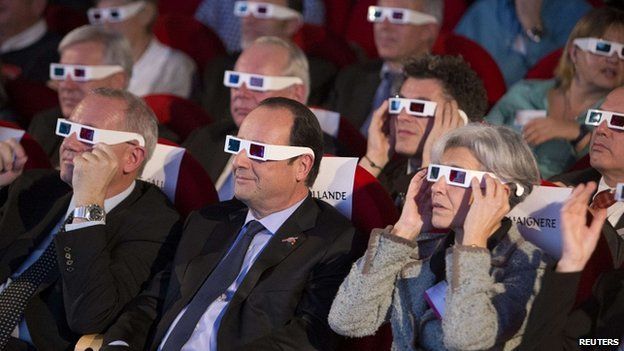France plans elite top-10 mega-university
- Published

Imagine the chagrin of French universities whenever international rankings are published.
The top places are invariably filled with the US and UK academic powerhouses. And then coming up fast are the ambitious Asian universities.
But what about the French, with their centuries of scholarship and ancient institutions? There was a university in Paris before Oxford or Cambridge.
French universities are conspicuous by their absence. In the most recent QS World University Rankings there were none in the top 20 and only two in the top 100.
That could all change from next year.
As part of a huge government-driven academic and economic project, there will be a new university called Paris-Saclay, with a campus south of the French capital. The project has initial funding of 7.5bn euros (£5.9bn) for an endowment, buildings and transport links.
Top 10 in a decade
The French government is bringing together 19 institutions into a single structure, with the aim of building a university big enough to compete with global giants like Harvard or the Massachusetts Institute of Technology (MIT).
Dominique Vernay, the president of this new university, says that within a decade he wants Paris-Saclay to be among the top ranking world universities.
"My goal is to be a top 10 institution," he says. In Europe, he wants Paris-Saclay to be in the "top two or three".
In university rankings, big is beautiful, and the Paris-Saclay will have 70,000 students and 10,000 researchers. There will be an emphasis on graduate courses and recruiting more international students and staff.
More stories from the BBC's Knowledge economy series looking at education from a global perspective and how to get in touch
The idea of bringing together individual colleges into a "federal university" has been borrowed from the UK.
"Our model isn't that far from the Oxbridge model," he says.
To put it into scale, Mr Vernay says Paris-Saclay is going to be twice the size of the University of California, Berkeley, one of the flagships of the US university system.
Technology start-ups
Without any extra investment, he says that the existing component parts of the university will put Paris-Saclay straight into the top 20 of the Shanghai global university rankings.
It will inherit staff with Nobel Prizes and some very well-established founding partners, including the Ecole Polytechnique, the HEC Paris business school and the National Centre for Scientific Research (CNRS).
Getting into the top end of the league tables is not the purpose of the investment, he says. But it would be an important indicator of how France can create a much more concentrated and globally competitive research base.
The big idea is to create a "knowledge hub" around Paris, bringing together top-level universities with research institutes, hi-tech businesses and start-ups.
The classic example of such a project would be Silicon Valley in California where Stanford University has been the launchpad for firms such as Google and Hewlett Packard.
Boston would be seen as another such hi-tech cluster, with Harvard and MIT feeding ideas into technology firms. In London, Imperial College and University College London are planning expansions to tap into this drive for innovation.
But in this industrial geography of the internet age, with the emergence of these academic-industrial complexes, Paris has been falling behind.
'French garden'
"The essence of the plan is that we are missing growth in France. It's not the big companies, what we're missing is the new technology, those small companies that grow very fast and become new players," said Mr Vernay.
"We need to strengthen the links with industry, strengthen our ability to launch start-ups."
The president says that the Paris-Saclay project should be seen as part of the next great historic wave of French higher education.
The grand ecole that produced the scientists and administrators for Napoleon's empire were very successful specialist institutions. And investment after World War Two supported more research in specialist areas, such as nuclear power.
But Mr Vernay says they have been too small, too disparate and lacking in co-ordination to compete in the modern, globalised economy.
He likens it to a "French garden", with different types of flowers growing in splendid isolation.
"There is a very fragmented landscape. We want to re-group institutions so that they can run as a single organisation, in terms of strategy, research and training."
Language barrier
Another barrier to overcome has been the past reluctance to use anything except the French language.
The common language of higher education, particularly in the sciences, has increasingly become English.
"I am very pragmatic," he says. That now means that Paris-Saclay will be offering master's courses fully taught in English as well as French.
"It's not only allowed, it's now encouraged to teach in English."
From next year, degrees from the constituent colleges will begin to be awarded by Paris-Saclay.
Preparing the 1,300-acre campus, he says is like organising the building of a town. The Paris metro is being extended, linking the university with the city and Orly airport.
In some ways it's a very French response to globalisation.
Paris-Saclay will be part of a chain of centrally planned, academic "grand projets", fast-tracking research in the way that a generation ago France was building high-speed railways or the monumental architectural projects in Paris.
The ambition is about safeguarding an uncertain future for France.
"We want to give something back to our country. We are in an economic war," says Mr Vernay.